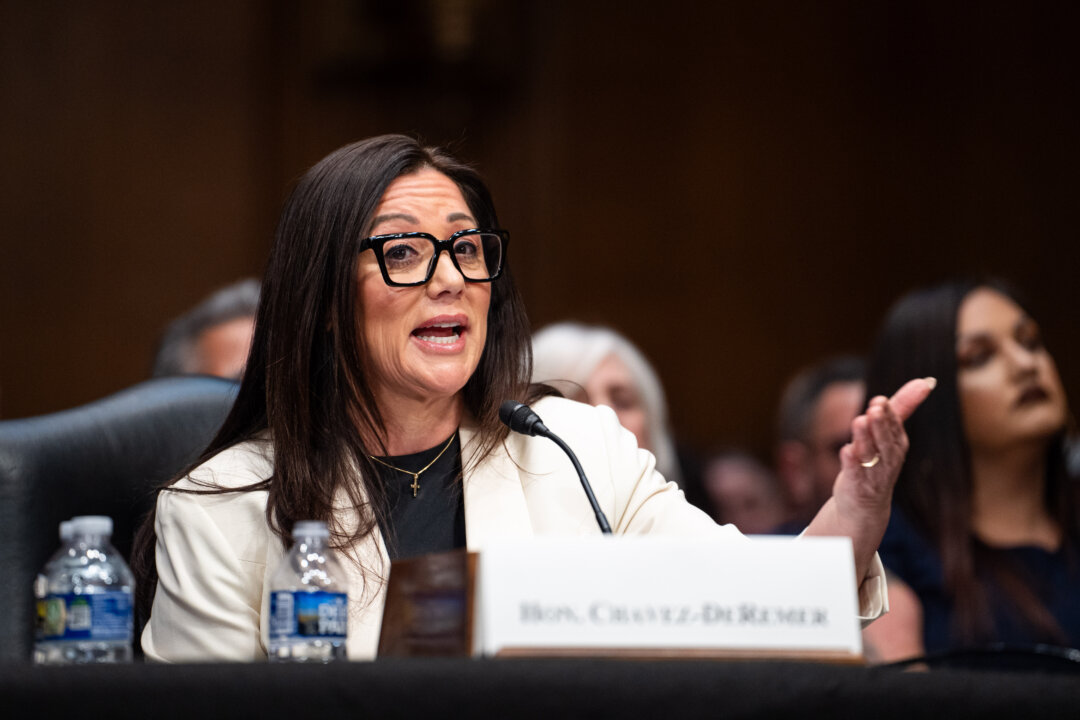President Donald Trump’s nominee for labor secretary told lawmakers during her Senate confirmation hearing on Wednesday that she no longer supports a pro-union piece of legislation challenging states’ right-to-work laws that she once backed as a lawmaker in Oregon.
Former Rep. Lori Chavez-DeRemer (R-Ore.) previously represented a swing district that includes parts of Portland. While in Congress, she co-sponsored the Protecting the Right to Organize (PRO) Act, a sweeping labor reform bill aimed at making it easier for workers to unionize. The bill passed the House in 2021 but stalled in the Senate.
During her Feb. 19 testimony on Capitol Hill before the Senate Committee on Health, Education, Labor, and Pensions, Chavez-DeRemer addressed her past support for the PRO Act, explaining that she saw the legislation as a way to facilitate discussions on labor law reforms.
However, she also acknowledged its flaws and made clear that her focus, if confirmed, would be on implementing Trump’s labor policies rather than advocating for new legislation.
“I recognize that that bill wasn’t perfect, and I also recognize that I am no longer representing Oregon as a lawmaker,” she said. “If confirmed, my job will be to implement President Trump’s policy division, and my guiding principle will be President Trump’s guiding principle, ensuring a level playing field for businesses, unions, and, most importantly, the American worker.”
Throughout the hearing, senators pressed her on the PRO Act’s provisions, particularly its impact on right-to-work laws, which shield workers from being forced to join a union or pay union dues as a condition of employment. The bill’s challenge to these laws was a major reason it faced fierce opposition from Republicans and business groups, who ultimately defeated it.
Sen. Bill Cassidy (R-La.) asked if she still supported the PRO Act, to which Chavez-DeRemer responded that as labor secretary, her role would not be to write laws but to enforce them. She emphasized that such decisions rest with Congress.
Sen. Rand Paul (R-Ky.), who has expressed opposition to her nomination, focused his questioning on the PRO Act’s impact on right-to-work states. Paul said that these 26 states have double the employment growth and five times the manufacturing growth of states without right-to-work protections.
He also cited figures showing that workers in right-to-work states have, on average, $3,000 more in disposable income.
Paul characterized the PRO Act’s attempt to override state right-to-work laws as a “horrendous invasion” of state sovereignty and asked Chavez-DeRemer to clarify her position.
Chavez-DeRemer reaffirmed her support for states’ rights on the issue, stating, “The right to work is a fundamental tenet of labor laws, where states have a right to choose if they want to be a right-to-work state, and that should be protected.”
Paul interjected, saying, “The PRO Act would have overturned that.”
Chavez-DeRemer clarified her previous position, explaining that she originally supported the bill in part because she was representing Oregon’s Fifth District, but also because she wanted to be “at that table and have those conversations.” However, she added, “I fully and fairly support states that want to protect their right to work.”
Paul pressed further, asking, “So you no longer support the aspect of the PRO Act that would’ve overturned state right-to-work laws?”
“Yes,” Chavez-DeRemer said.
Sen. Bernie Sanders (I-Vt.) asked if she supported raising the minimum wage, to which she responded that she sympathized with employees but “can’t weigh in on that as it’s determined by Congress.”
Sen. Andy Kim (D-N.J.) pressed Chavez-DeRemer on whether the $7.25 federal minimum wage is enough to live on.
“I just want to ask you, do you think that there is a state in this country where someone can live comfortably on their own for $15,000 a year?” Kim asked, citing the yearly total of the federal minimum wage.
“Well, I don’t know if there is, but I would look to work with Congress,“ Chavez-DeRemer said. ”This is, this is a congressional issue.”
Kim also questioned her on affordable housing, with Chavez-DeRemer avoiding specifics but reiterating her intent to work with lawmakers on various issues of concern to American workers.
“I will come out and visit every state and understand what’s important to them, and tell that story, not only to the president, but also work with members of Congress,” Chavez-DeRemer said. “I will fully and fairly enforce the minimum wage laws that you all see fit.”
If confirmed, Chavez-DeRemer would lead the Department of Labor, which oversees nearly 16,000 full-time employees and operates with a proposed $13.9 billion budget for fiscal year 2025.
The agency influences policies affecting wages, unionization rights, workplace safety, and employers’ hiring and firing decisions.

